By Todd Burgreen
The Rock River Arms (RRA) 9mm LAR9 models are the latest twist on what Colt started in the early 1980’s with its Fourth Generation SMG Model 635 9mm. The Model 635 was patterned off of the M16/AR platform firing from a closed bolt and had the same physical characteristics as the M16/AR-15 including sights, operating controls, and trigger. The Colt 9mm utilized a blowback operation method, rather than the M16/AR-15 direct impingement gas system. The Rock River LAR9 carbine springs from this heritage operating with Colt or modified Uzi magazines. The other pattern 9mm AR encountered is the Olympic design. Pattern differences stem from design of the magazine block utilized and type of magazines that are used. While the original Colt was select-fire, the RRA LAR9 SBR carbine evaluated in this article is not. The semi-auto only SBR path is not that much of a compromise due to the weapon retaining handling characteristics of the original design.
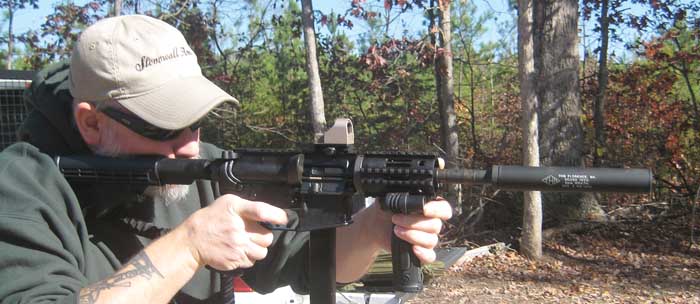
The RRA LAR9 is commonly referred to as Colt pattern 9mm AR. However, recent RRA design modifications translate into RRA deserving to be considered a separate 9mm AR pattern in its own right. Design changes consist of foregoing the magazine block conversion of a normal AR lower; instead, an integral magazine well is molded into the LAR lower receiver. The LAR9 being equipped with 9mm specific hammer, trigger springs, recoil buffer and action springs further makes the case of the RRA design deserving to be considered a separate AR 9mm set up. The RRA modifications enhances reliability as there is no chance of a conversion block moving once installed as some are prone to do. In conjunction with this, the integral 9mm magblock provides a feed ramp for rounds being fed into the chamber.
Other differences between 9mm AR and .223 ARs are related to the 9mm AR working via blowback. The bolt carrier on the 9mm AR needs to be much heavier due to this operating method. It is one piece as compared to the .223 rotating bolt head. The bolt still recoils into the buffer tube located in the stock; thus side folding stocks are not an option with the 9mm ARs. The 9mm bolt face is integral to the bolt and the bolt itself is totally different in configuration due to making room for the ejector that protrudes up from the magblock sliding along its length. Lastly, there are no rotating/locking lugs on the 9mm bolt face.
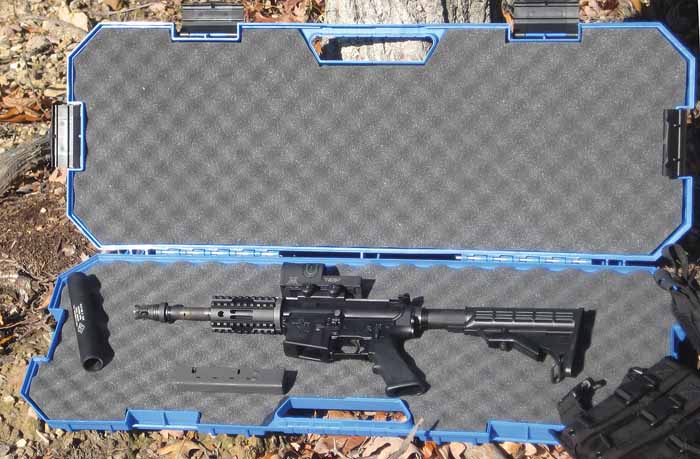
Rock River offers a full line of 9mm AR pistols with 7 inch and 10 inch barrels along with 9mm AR rifles featuring 16 inch barrels of various configurations. The 7 inch barrel SBR tested can be had by special order. The RRA LAR9 SBR weighs just over 5 pounds with the 7 inch barrel surrounded by a free floated quad rail and measures 24-27 inches in length with 6-position adjustable CAR stock. An A1 flash hider is mounted with 1/2-36 thread pattern. The 7 inch Wilson chrome-moly barrel features 1:10 twist rate. This twist rate is better suited to take advantage of the full range of 9mm loads – 115gr through 147gr. Also, the 7 inch barrel gets the most out of the 9mm, which is typically loaded to maximize 4-5 inch barrel lengths common in pistols, while allowing for a suppressor to mount, yet still staying below a 16 inch barrel length and weight even with a suppressor mounted.
The RRA LAR9 SBR is often referred to as a pistol caliber carbine. A civilian concerned with home defense will find no compromise with the RRA LAR9 with its high capacity, great handling, and its 150yd range. Of course, target shooting and similar activities are other options.
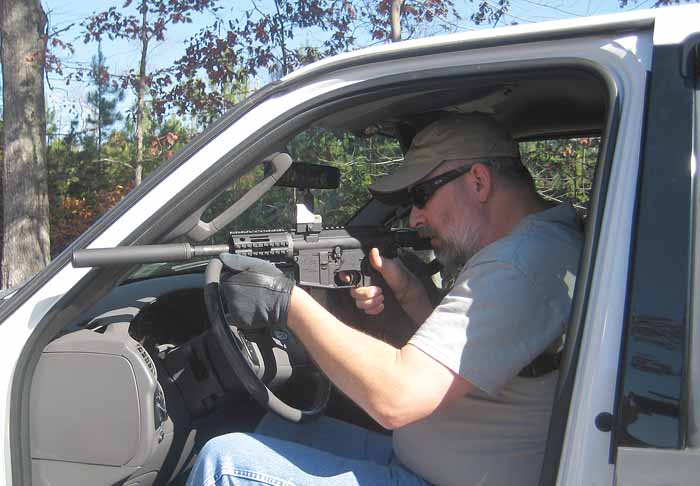
Even though chambered in the 9mm pistol cartridge, the LAR 9 SBR is a much more potent package than any handgun due to its increased accuracy, therefore effective range, and ammunition capacity. One of the advantages derived is that it is far more accurate compared to any handgun. This is based on multiple points of contact when interfaced with the shooter. This consists of shoulder, cheek, and hands spread further apart for more stability compared to when handling a handgun. This accuracy advantage is further accentuated by the LAR9 with its crisp trigger, controllable light recoil, firing from a closed bolt, and minimal muzzle blast. The muzzle blast differential between a 9mm carbine versus an intolerable rifle muzzle signature is further accentuated in confined spaces – such as inside a home if serving in personal defense role. The old standard touting the advantage of having both a carbine and handgun chambered in the same caliber should not be casually dismissed, especially if one is not supported by an organized logistics chain. The RRA LAR9’s increased capacity, as represented in the 25- or 32-round magazines, is another advantage over a handgun chambered in a similar round. Many more 9mm rounds can be carried for the same weight and less space compared to rifle rounds. Two of the slim modified Uzi or C-Product magazines fit into the same space as one M16/AR-15 magazine. The semi-auto pistol caliber carbine, especially when SBR’d, is even lighter and better handling than its 16 inch brethren, without suffering any loss in potency as compared to when a centerfire rifle cartridge is fired from a short barrel. While not as prevalent of late, there is an economic advantage in terms of the amount of 9mm that can be purchased versus a rifle cartridge. This economics can be taken advantage of with more training; not to mention the ability to access indoor ranges with a pistol caliber carbine such as the RRA LAR9. Training regimen is further enhanced by the 9mm carbine’s ability to be used with steel plate targets without having to resort to specialty frangible rifle loads.
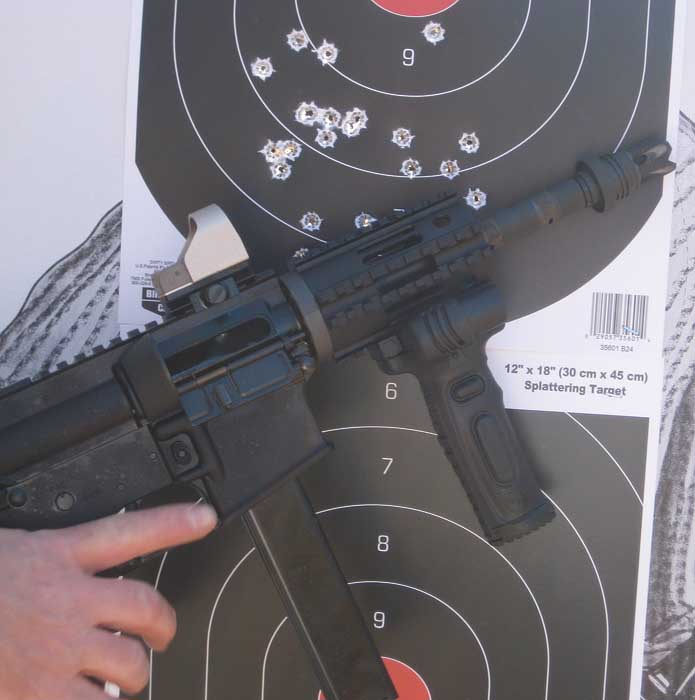
The RRA LAR9 benefits from proven M16/AR-15 ergonomics, operating controls, ease of accessorizing, sights, and other modifications that have evolved over the years since the original Colt 635 was introduced; not to mention broad familiarity with the M16/AR-15 platform in the shooting culture. The LAR9 SBR tested featured a free floated quad rail and A4 flat top receiver allowing for easy mounting of accessories. A conscious decision was made to minimize any weight added and any accessory was scrutinized for benefit added versus weight added. The effective range of the 9mm carbine makes magnified optics are, in this author’s opinion, pointless. Indeed, many would contend that open sights such as the Lewis Machine & Tool sights used for co-witnessing and back up are fine in their own right with nothing more required. However, a low profile Insight MRDS red dot weighing only 1 ounce was mounted. The battery operated Insight optic has variable intensity settings to optimize dot clarity based on conditions. The MRDS mounted on the RRA LAR9 SBR featured the 3.5 MOA dot with a 7 MOA version also available. The only other accessory deemed worthy of inclusion was the Crimson Trace (CTC) MVF 515 laser/light vertical foregrip. The CTC MVF is multitasking at its best combining sighting laser and high intensity tactical light with vertical forward grip in one 10.2 ounce package.
No carbine, no matter what theoretical advantage is offered, is worth anything if not reliable. As with most automatics, magazines are the crucial linchpin. Rock River supplies one modified 25-round Uzi magazine with the LAR9 and multiple types of these magazines were purchased along with C-Products 32-round magazines to augment T&E. A wide range of 9mm loads were tested consisting of multiple bullet profiles and weights. 115gr, 124gr, and 147gr JHP and FMJ loads from Black Hills, CCI, Federal, Hornady, Remington, Winchester, and Wolf were tested. The RRA LAR9 SBR was sighted in 1 inch high at 25yds which gives a 50 yard zero and 9 inches low at 100 yards trajectory. The ease of mounting various sights with the LAR9’s Picatinny rail is really appreciated, especially when compared to others on the market that are quite limited in this capability. The forward quad rail follows this theme in terms of lights/lasers/forward grip.
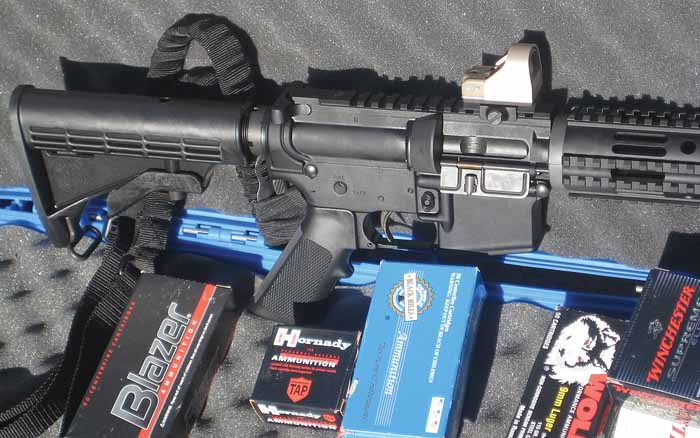
Many turn to the 9mm AR carbine for the reduced recoil and muzzle blast represented by the 9mm pistol cartridge. Others point to it for the ease of suppressing the 9mm. By simply removing the provided A1 Flash hider and screwing on a Yankee Hill Machine (YHM) Phantom Flash Hider, a Wraith 9mm QD Suppressor is easily mounted. The Wraith is designed for use on SMGs being constructed from aircraft grade aluminum and stainless steel. Its overall length is 7.5 inches with a diameter of 1.25 inches and weighs only 5.8 ounces while still offering a 30db noise reduction. The Wraith can be mounted on the RRA LAR9 7 inch barrel and yet still be shorter than a 16 inch barrel rifle in total length. Range time consisted of not only testing accuracy and reliability of the rifle with all types of ammunition, but also ensuring that the YHM Wraith in no way compromised the established baseline of accuracy and reliability. The RRA 1.5 inch at 50 yards guarantee was maintained with the YHM suppressor installed with no point of impact shift. Another pleasant surprise was the consistent point of aim enjoyed no matter weight or type of 9mm load used. The 147gr 9mm is subsonic and the obvious choice for use with a suppressor. However, the Wraith proved effective at taming the muzzle blast of even the 115gr and 124gr +P loads. It comes down to just not that much powder/blast in a 9mm to contain. All loads could be comfortably fired without the use of ear protection with the suppressor installed.
The first range session consisted of nearly 500 rounds to gain confidence in the RRA LAR9’s reliability. The RRA LAR9 SBR’s first test was a function test consisting of dumping multiple magazines in quick succession. 9mm ARs have a reputation for being finicky at best and cranky at worst. The RRA LAR9 exhibited none of this even when the suppressor was used. Bullet profiles ranged from Golden Saber, TAP, SXT, Ranger, JHP, TMJ, and FMJ with weights from 115gr, 124gr, 147gr and loads a mixture of standard, +P, and subsonic. The only loads that exhibited any issues involved cartridge cases not made from brass, especially the aluminum variety. Surprisingly, the steel cases operated well enough to be considered for training and range time, but not for personal defense. Brass cased ammunition proved utterly reliable during range visits.
A word must be said of the advantage derived from the LAR9’s similar feel to the ubiquitous AR-15. A conversation with Rock River’s LE/Government Sales Manager Steve Mayer put it best, “The accuracy, even at what would be considered “rifle” distances, is very good (with the LAR9). Too many SMGs are based on their being large, awkward pistol-type weapons rather than compact rifles. The LAR-9s, being based on the M16/AR-15-type platform, shoulder well and are an easy transition for a shooter used to the rifle-caliber versions to shoulder and fire on target. That’s part of the voodoo – if you think you can hit a target, the more likely you are to take the time to aim a little bit longer/better, to exercise better trigger discipline and control, and in general, score more hits. If you’re used to shooting an AR-type rifle in 5.56 at 200-300 yards, and you throw a 9mm version up to your shoulder to engage targets at 100 yards, your muscle memory takes over and you naturally engage the target just as you would with the rifle caliber. Your confidence just takes over.”
Once the Rock River LAR9 SBR proved reliable, it was then put through its paces on different rifle courses that were set up for a pending law enforcement competition that was to be held at the range. Magazine changes, shooting from behind cover, transitions between shoulders and firing from unconventional positions put the LAR9 through its paces. The time and paperwork necessary to SBR the carbine is well worth it considering how the short barrel length accentuates all of the good characteristics related to handling. Strings of fire ranged from 15 rounds to 80 rounds with multiple targets placed at distances measured in feet out to over 100 yards. The recoil impulse of the 9mm AR is often commented on as being stouter than expected. This may be derived from the blowback operation method sending the heavy bolt vigorously to the rear. Various sources offer opinions that this reputation comes from the full-automatic variants with cyclic rates approaching 900 rpm causing shooters to lose control when firing on full-automatic. The RRA LAR9 SBR was pleasant to shoot and capable of fast follow up shots with minimal sight displacement. Total rounds fired involving several range visits was over 1,400. The rifle was cleaned between range visits.
A pistol caliber carbine can never be compared across the board to a weapon firing a rifle round due to effective range and lethality of the pistol round versus a 5.56, 5.45×39, 7.62×39, 7.62×51, etc. However, a 9mm carbine typified by the Rock River LAR9 is not a weapon to be ignored for personal defense, especially with the added twist of a 7 inch barrel and a suppressor installed. Beyond a doubt, the Rock River LAR9 SBR is much more potent than any handgun and should not be underestimated for what it offers in terms of effectiveness in the civilian realm whether it is for protection, training, or sport. Sites of Interest
Rock River Arms
1042 Cleveland Rd
Colona, IL 61241
(866) 980-7625
www.rockriverarms.com
Crimson Trace Corp.
9780 SW Freeman Dr
Wilsonville, OR 97070
(800) 442-2406
www.crimsontrace.com
Insight Technology
9 Akira Way
Londonderry, NH 03053
(866) 509-2040
www.InsightTechnology.com
Lewis Machine & Tool, Inc
1305 11th W
Milan, IL 61264
(309) 732-9527
www.lewismachine.net
Yankee Hill Machine Company, Inc
20 Ladd Ave, Suite 1
Florence, MA 01062
(413) 586-1326
www.yankeehillmachine.com
| This article first appeared in Small Arms Review V13N10 (July 2010) |












